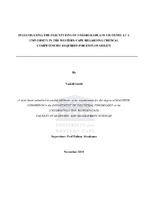| dc.description.abstract | The employability of graduates has been a global point of concern. Within a South African context, this issue is proliferated not only by a reported gap between employers’ expectations and those of students, but also by an exponential rise in graduate unemployment. Examining undergraduates’ perspectives regarding competencies necessary to enhance their employability as well as their efficacy beliefs regarding their perceived competence in certain competencies, is one means of gaining insights and working towards narrowing between student and industry expectations and perceptions.
The primary objective of this study was to examine Industrial Psychology (IPS) undergraduate students’ perceptions of critical competencies needed for employability, their efficacy beliefs regarding their level of perceived competence in these competencies and to determine the discrepancies between these viewpoints based on certain demographic variables. This research sought to gain an understanding of IPS undergraduates’ perspectives, a perspective that previous literature has not yet addressed. Quantitative data was obtained from 151 IPS undergraduate students during the course of their respective lectures, by means of a questionnaire instrument, which comprised of two sections. The first section sought to elicit demographical information and the second section consisted of questions related to their perceptions of the importance of certain competencies, as well as their self-perceived competence in relation to these.
Descriptive analyses demonstrated that IPS undergraduates regarded all of the twenty-four listed competencies as quite important for employability, some being rated as critically important and others of lesser importance by comparison. Additionally, in terms of their efficacy beliefs in their competence in these competencies, the sampled undergraduates felt they possessed a slightly above average level of competence overall, indicating a fair amount of self-efficacy. Furthermore, inferential statistical analyses were conducted to investigate the respective perceptions based on gender, age, work experience and year level of study. These results indicated several statistically significant findings between the various categories. It was evident that gender, age, work experience and year level of study played a role in the perceptions by the sampled group of IPS undergraduates, in respect to a few of the competencies highlighted. In conclusion, these perceptions may be able to add to the body of knowledge and aid in the development of IPS undergraduates from an academic and professional point of view. | en_US |

